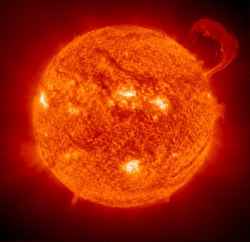
SOHO is celebrating ten years in space on 2nd December. Image credit: SOHO Click to enlarge
The world’s flagship solar probe, the Solar and Heliospheric Observatory (SOHO), is celebrating ten years in space on 2nd December. Scientists are gathering at CCLRC Rutherford Appleton Laboratory on the anniversary of the launch to celebrate the achievements of SOHO which has revolutionised our understanding of our star, the Sun, and its impacts on the Earth.
The 12 instruments on board SOHO probe the Sun’s every detail. One, the Coronal Diagnostic Spectrometer (CDS), is led from the UK, another was partly built in the UK, and UK scientists are involved in the operations and research of all instruments. SOHO’s instruments are monitoring the complex, violent solar atmosphere, the charged gases that the Sun expels into space and examining the solar interior.
“Never before have we had such a detailed view of a star. All life on Earth is dependent on the Sun’s energy, and when the Sun ejects clouds into space which engulf the Earth it can have severe consequences for satellite systems, navigation, communication and power distribution systems. We need to understand how the Sun works and how to predict how its activity impacts on the Earth”, said Professor Richard Harrison, from the CDS team.
“SOHO has provided us with a comprehensive, detailed examination of a star over an extended period, and has operated superbly during that time. The advances generated by this mission are incredible”, commented Professor Len Culhane of the UCL Mullard Space Science Laboratory.
The mission has revealed the true nature of the Sun’s violent atmosphere as it flings clouds into space and as huge magnetic loops tie themselves in knots to generate solar flare explosions. Scientists have discovered that the solar atmosphere is riddled with Earth-sized explosions and occasional tornadoes and the mission has also revealed how the interior of the Sun rotates. SOHO has even discovered over 1000 comets as they pass close to the Sun – a world record. Sophisticated observations have allowed scientists to monitor the far-side of the Sun and instruments have enabled weather maps of the Sun’s atmosphere – probing temperatures, densities, solar wind speeds and even what the Sun is made of, from a distance of 150 million km.
Professor Keith Mason, Chief Executive Officer of the Particle Physics and Astronomy Research Council, the main funder of the UK involvement in the mission, said “SOHO continues to be a stunning success and over its extended lifetime has provided the scientific community and the public with a wealth of data about the Sun. Its success is testimony to the expertise of the scientists and industrialists, in the US and Europe, including the UK, that have worked on its design and operation.”
Original Source: PPARC News Release
